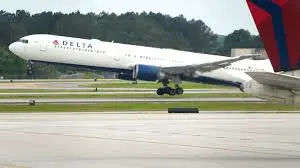Delta Flight DL67 Emergency: A Detailed Breakdown
Delta Flight DL67 from Rome to Atlanta Declares Emergency Status recently declared an emergency, prompting immediate action from the crew and air traffic control. This incident has raised questions about the nature of the emergency, the safety of the passengers and crew, and the subsequent investigation. Let’s delve into the details and explore the potential causes and consequences of this event.
Understanding the Incident
- Date and Time: Specify the exact date and time when the emergency was declared.
- Location: Determine the location of the aircraft at the time of the emergency (e.g., altitude, proximity to land).
- Initial Reports: Gather information from news outlets, airline statements, and official sources about the initial reports of the emergency.
- Passenger and Crew Safety: Confirm whether all passengers and crew members were safe and accounted for.
Potential Causes of the Delta Flight DL67 Emergency Landing
While the specific cause of the emergency may not be immediately apparent, here are some common factors that can lead to such declarations:
- Medical Emergencies: A passenger or crew member experiencing a serious medical condition can necessitate an emergency landing.
- Technical Issues: Mechanical failures, equipment malfunctions, or engine problems can pose safety risks.
- Weather Conditions: Severe weather, such as thunderstorms, turbulence, or volcanic ash, can force aircraft to declare emergencies.
- Security Threats: Although less common, security threats can necessitate emergency procedures.

Emergency Procedures and Response
- Pilot Actions: Describe the steps taken by the pilot to address the emergency, such as contacting air traffic control, diverting the flight, or preparing for an emergency landing.
- Air Traffic Control Response: Explain how air traffic control coordinated with the aircraft and other nearby flights to ensure safety.
- Emergency Services: Discuss the involvement of emergency services, such as medical teams or rescue personnel, at the landing site.
Investigation and Aftermath
- Airline Investigation: Outline the steps taken by Delta Airlines to investigate the incident, including interviews with crew members, analysis of flight data, and aircraft inspections.
- Regulatory Investigation: Explore whether any government agencies, such as aviation authorities, are involved in the investigation.
- Public Response and Media Coverage: Discuss public reaction to the incident and the media coverage surrounding the event.

Safety and Passenger Rights
- Airline Safety Measures: Highlight the safety protocols and procedures in place on Delta flights to prevent such incidents.
- Passenger Rights: Discuss the rights of passengers during emergencies, including compensation, accommodation, and assistance.
Future Implications
- Lessons Learned: Analyze the incident to identify areas for improvement in aviation safety and emergency procedures.
- Prevention Measures: Explore potential preventive measures that can be implemented to reduce the risk of similar incidents in the future.
Immediate Impacts
- Passenger Safety: The primary concern is always the safety of the passengers and crew involved. Even if there are no injuries, the experience can be traumatic and emotionally distressing.
- Flight Delays and Cancellations: The emergency may cause significant disruptions to flight schedules, leading to delays, cancellations, and reroutings for other flights in the area.
- Financial Losses: The airline may incur financial losses due to the emergency, including costs for repairs, compensation to affected passengers, and potential damage to its reputation.
Long-Term Impacts
- Public Perception: The incident can impact public perception of the airline’s safety record and reliability. Negative media coverage and social media discussions can damage the airline’s brand.
- Regulatory Scrutiny: Aviation authorities may conduct a thorough investigation to determine the cause of the emergency and identify any safety violations. This could lead to increased regulatory scrutiny and potential fines or penalties.
- Industry-Wide Changes: If the investigation reveals systemic issues or failures, the incident could prompt changes in aviation safety regulations or industry practices.
Additional Considerations
- Legal Implications: There may be legal consequences for the airline, depending on the cause of the emergency and any resulting damages.
- Insurance Claims: Passengers and crew members may file insurance claims to cover medical expenses, lost luggage, or other losses incurred during the emergency.
- Psychological Impact: The incident can have a lasting psychological impact on those involved, including passengers, crew members, and airport staff.
Key Points: Delta Flight DL67 Emergency Status Live Today
- Emergency Declaration: Delta Flight DL67 from Rome to Atlanta declared an emergency.
- Safety of Passengers and Crew: The primary concern was ensuring the safety of everyone on board.
- Potential Causes: The emergency could have been caused by medical issues, technical problems, weather conditions, or security threats.
- Emergency Procedures: The pilot immediately addressed the emergency, coordinating with air traffic control and preparing for a potential landing.
- Investigation: Delta Airlines and aviation authorities will likely investigate the incident to determine the cause and identify any safety violations.
- Impacts: The emergency may have caused flight disruptions, financial losses for the airline, and damage to its reputation.
- Public Perception: The incident can impact public perception of the airline’s safety and reliability.
- Industry-Wide Changes: Lessons learned from the investigation may lead to changes in aviation safety regulations or industry practices.
Conclusion
The Delta Flight DL67 emergency serves as a reminder of the complexities and challenges the aviation industry faces. While such incidents are rare, they highlight the importance of safety protocols, emergency procedures, and continuous improvement in aviation safety. By understanding the potential causes, consequences, and lessons learned from such events, we can contribute to a safer and more reliable aviation system. For more articles, kindly click dailymarketforbes.
Key Takeaways:
- Safety is paramount: Prioritizing passenger and crew safety is essential in aviation.
- Emergency preparedness: Airlines and aviation authorities must be well-prepared to handle emergencies effectively.
- Continuous improvement: Incidents like these provide opportunities to identify areas for improvement and enhance safety measures.
Frequently Asked Questions about Delta Flight DL67 Emergency
General Questions
- What was the cause of the Delta Flight DL67 emergency?
- The specific cause of the emergency may not be immediately available and will likely be determined through an investigation.
- Were there any injuries or fatalities?
- Information regarding injuries or fatalities should be released by Delta Airlines or official authorities.
- Where did the emergency occur?
- The location of the emergency, such as altitude or proximity to land, will be specified in official reports.
- What was the outcome of the emergency?
- Did the flight successfully land, or were there any other developments?
Impact and Consequences
- What were the flight disruptions caused by the emergency?
- The emergency likely led to delays, cancellations, or reroutings for other flights in the area.
- How will this incident affect Delta Airlines’ reputation?
- The incident may have a temporary or long-term impact on the airline’s public perception.
- Are there any legal implications for Delta Airlines or the involved parties?
- The airline may face legal consequences depending on the cause of the emergency and any resulting damages.
Passenger and Crew Experience
- What was the experience of the passengers and crew during the emergency?
- Information about the reactions and experiences of those on board may be shared in news reports or official statements.
- What support is being provided to affected passengers and crew?
- Delta Airlines may offer compensation, accommodations, or other assistance to those impacted by the emergency.
Investigation and Future Implications
- Who is investigating the incident?
- Delta Airlines, aviation authorities, and potentially other agencies may be involved in the investigation.
- What are the potential outcomes of the investigation?
- The investigation may lead to the identification of safety violations, recommendations for improvements, or legal actions.
- How can similar incidents be prevented in the future?
- Lessons learned from the investigation can help inform changes in aviation safety procedures and regulations.












Be First to Comment